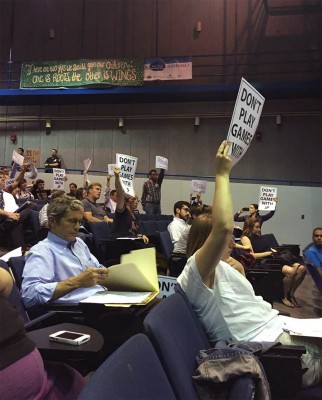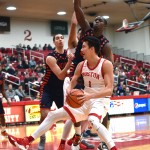
After unveiling an updated proposal for Boston’s bid for the 2024 Summer Olympics, organizing group Boston 2024 held a meeting Tuesday in Jamaica Plain to receive feedback from the community.
The meeting was chance for residents to talk about the plan, dubbed “Bid 2.0,” in regards to public infrastructure, neighborhood development and taxes before the bid is presented to the International Olympic Committee for approval in 2017. After the meeting, members broke into groups to discuss these areas in more detail.
John Fitzgerald, director of Olympic operations and special projects at the Boston Redevelopment Authority, placed focus on hearing and responding to the public’s feedback.
“We want to make sure it’s what’s best for the city, so we look forward to getting your input — ideas, feedback, criticisms,” he said during the presentation. “Thank you for just engaging in your civic duty.”
The latest budget for the bid projects $4 billion in private investment, concentrated in the construction of an Olympic Stadium in Widett Circle and an athlete’s village in Columbia Point.
Kent Knight, vice president of Elkus Manfredi Architects, spoke about infrastructure for the games and how each site can contribute to the bid proposal.
“Based on all of these meetings, we revised each venue proposed and evaluated each selection against the criteria: International Olympic Committee requirements, community support, information we’ve gotten from these meetings, the cost and the quality of the bid,” he said.
Boston 2024 also looks to partner with various schools, including Harvard University, Northeastern University and the Massachusetts Institute of Technology, to use their sporting complexes for the games, The Daily Free Press reported on June 27.
In a breakout group presentation about the effect the Olympics will have on transportation, Jim Gillooly, deputy commissioner at the Boston Transportation Department, said rapid development of the MBTA supported by Boston 2024 parallels that of the Go Boston 2030 initiative, part of Boston Mayor Martin Walsh’s Imagine Boston 2030 platform.
The Bid 2.0 budget includes a $455 million stipend for technological improvements to the MBTA’s Red and Green lines. Additionally, the proposal has set aside $100 million for renovation of the Broadway T station entrance.
Nikko Mendoza, Boston 2024’s vice president of engagement and external affairs, talked about recognizing the opportunities the Olympic bid brings for the community as a whole.
“We’re cognizant of making sure that the experience for the spectators and athletes alike is superb, but equally important is the experience for the people who live and work in the city of Boston and our surrounding region,” she said after the meeting.
Mendoza said it is important to have a vision for hosting the Olympics that aligns with plans for Boston.
“If it doesn’t do that, then perhaps it’s not the best idea,” she said. “However, we do think it is a very unique alignment with where the city is going and Mayor Walsh’s ambitious and doable agenda for the next 20 years.”
Kerry Castor, 47, of West Roxbury, spoke positively of the bid and the impact it may have on the city.
“I think it’s going to be great for the city and the state. It’s going to bring economic wealth, it’s going to bring jobs … [and] it’s going to clean up the city without using tax dollars,” she said. “My kids want it, I want it, I’m excited for it and I’m a big supporter.”
Justin is a former Sports Editor for the Daily Free Press. In the past, he has covered the BU field hockey, men's basketball, women's hockey and women's lacrosse teams. Justin has interned at WEEI.com and serves as Editor-In-Chief of the Cleveland sports blog, Straight Down Euclid. Follow him on Twitter: @just_a_pal




